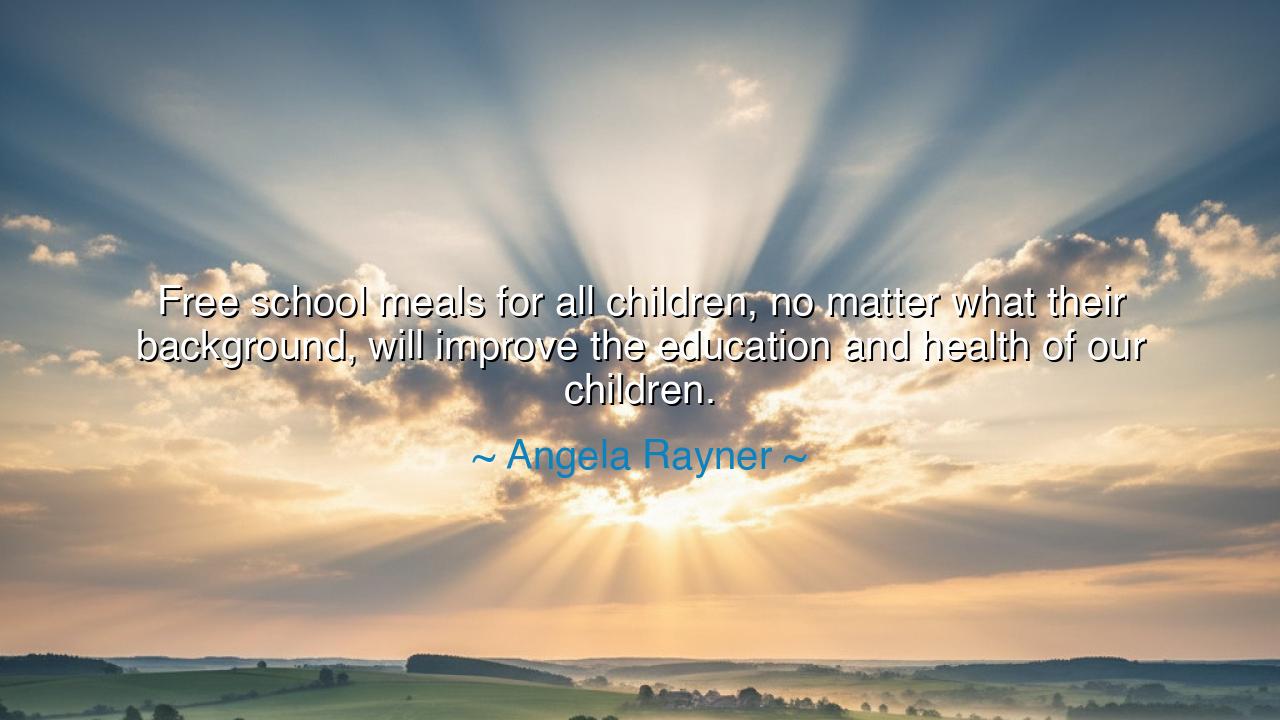
Free school meals for all children, no matter what their
Free school meals for all children, no matter what their background, will improve the education and health of our children.






In the compassionate and stirring words of Angela Rayner, we hear an ancient truth spoken in the language of our modern age: “Free school meals for all children, no matter what their background, will improve the education and health of our children.” These words are not merely a political statement or a policy proposal—they are a call to the conscience, a reminder that the strength of a nation is not measured by its wealth, but by the well-being of its youngest hearts. To feed a child, Rayner declares, is not charity; it is justice. For hunger dulls the mind, weakens the body, and dims the spark of potential that every child carries within them.
From the beginning of civilization, the wise have known that nourishment is the foundation of all learning. The philosophers of Greece spoke of a sound mind in a sound body, and the sages of the East taught that a starving soul cannot hear the voice of wisdom. So too does Rayner’s insight rest upon this timeless truth: that education and health are inseparable, and that the first lesson a child must receive is not from books, but from the bread that sustains them. For knowledge cannot take root in a hungry stomach, nor can imagination flourish when the body is weak. Thus, to feed the child is to cultivate the future.
The origin of Rayner’s words lies not in theory, but in experience. She herself grew up in poverty, a child of hardship who saw the barriers that hunger built. Her voice carries the weight of lived truth—of classrooms where children pretend to concentrate while their bellies ache, of mornings when breakfast is a dream and lunch is uncertain. When she speaks of free school meals, she speaks not from the halls of privilege but from the memory of struggle. Her advocacy is born of empathy, a recognition that the promise of equality begins not with words, but with nourishment.
Consider the story of Eleanor Roosevelt, who, during the Great Depression, championed school lunch programs in the United States. She knew that feeding the poor was not merely an act of mercy, but an act of strength. By ensuring that children were fed, she gave an entire generation the chance to learn, grow, and rise. The same spirit lives in Rayner’s words: that the care of children is the foundation of all progress. Civilizations fall when they neglect their young, but they endure when they protect them. A meal, humble as it may seem, can change the destiny of a child—and through the child, the destiny of a nation.
In Rayner’s vision, there is also a profound moral wisdom. By offering free school meals for all children, regardless of background, she seeks to erase the invisible lines that divide the fortunate from the forgotten. When all sit together to eat, there is no shame, no hierarchy, no hunger hidden behind pride. The meal becomes not just sustenance, but community—a daily affirmation that every child matters, that every life deserves dignity. This is not only an act of policy, but an act of humanity. It is the embodiment of an old truth: that we are bound together, and the well-being of the least among us nourishes the whole.
Her words also serve as a rebuke to indifference. Too often, the suffering of the poor is hidden behind statistics and debate. Yet Rayner reminds us that hunger is not abstract—it is a child’s empty plate, a teacher’s helplessness, a society’s moral wound. To ignore it is to betray our shared humanity. The act of feeding a child, by contrast, becomes a sacred duty, one that rekindles the bonds of compassion that hold a people together.
Let this, then, be the lesson for all who hear: true education begins with empathy. If we would build a wiser and healthier world, we must first ensure that no child is left unfed. Let every school be not only a house of learning, but a house of care. Support the policies, the programs, and the people who fight to make this vision real. For when we feed the child, we feed the future; when we nourish the body, we awaken the mind.
And so, remember the wisdom of Angela Rayner—that justice begins at the table, that equality begins with nourishment, and that every meal given in kindness is a seed sown for generations to come. For the true strength of any nation lies not in its armies or its riches, but in the bright, untroubled faces of the children it has chosen to feed.






AAdministratorAdministrator
Welcome, honored guests. Please leave a comment, we will respond soon